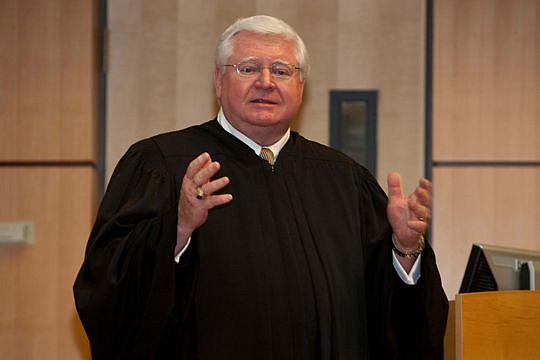
A skeptical Florida Supreme Court has moved to at least temporarily block Lee County judges from holding videoconference hearings in cases about whether mentally ill people should be involuntarily committed to treatment facilities.
Justices unanimously issued a stay late Tuesday afternoon, hours after listening to arguments about the use of videoconferences in what are known as Baker Act cases.
Public defenders last year challenged the use of video technology instead of judges or magistrates appearing in person at mental health facilities and sought a stay to halt the practice.
The Supreme Court issued a one-sentence decision and indicated a broader legal opinion would be issued later.
But Kathleen Smith, public defender in the 20th Judicial Circuit, which includes Lee County, said Wednesday she expects the decision to lead to in-person Baker Act hearings starting Friday.
During Tuesday’s hearing, justices pointedly questioned the legal basis for holding Baker Act hearings remotely, as Assistant Attorney General Caroline Johnson Levine argued in support of allowing videoconferences. Lee County judges did not take part in the hearing.
“So all of our circuit judges could simply say we’re not coming to the courthouse and we’re not going to conduct anything in person, we’re just going to set up TV cameras and I am going to sit by my pool having an iced tea and enjoying myself, and I’ll just do everything from there?” Justice R. Fred Lewis asked at one point.
“And there’s nothing that requires that judge to be in person conducting judicial business?” he continued.
Robert Young, an attorney in the 10th Judicial Circuit public defender’s office, argued videoconferences particularly pose difficulties for some people with mental illnesses.
“You’re talking about folks who are often overstimulated by their surroundings and asking them to attend to conversations both in front of them and on the screen,” said Young, who represented the opponents at the Supreme Court.
The issue went to the Supreme Court after a panel of the 2nd District Court of Appeal ruled in September that nothing bars Lee County judges from holding videoconference hearings in Baker Act cases — though the panel expressed reservations about the practice.
The Supreme Court initially refused a request from public defenders to stay the practice, but the ruling Tuesday vacated that decision.
While videoconferences began last year in Lee County, judges in other areas also have looked at the idea.
Jeffrey Colbath, chief judge of Palm Beach County’s 15th Judicial Circuit, filed a friend-of the-court brief that said his circuit was moving toward using remote hearings in Baker Act cases.
Colbath took part in Tuesday’s arguments at the Supreme Court and said the idea involves “management of resources,” at least in part because the Legislature has not provided money to add judges.
He said sprawling Palm Beach County has seven mental health facilities.
“Right now, we’re doing so much with so little, and as we all know very well, the Legislature is being pretty stingy with us,” Colbath said. “And if I had a couple of extra magistrates, I wouldn’t have had to explore this. I mean, it’s really that simple.”
But Smith, the public defender in the 20th Judicial Circuit, questioned why people with mental illnesses should be “treated any differently” from other people who go before judges for in-person hearings. Like Young, she pointed to the difficulties that mentally ill people might have with taking part in hearings through TV screens.
Smith told The News Service of Florida on Wednesday “it’s not really a quality of technology issue. It’s the fact that mentally ill people that are experiencing these kinds of symptoms can’t appreciate or participate in the hearing fully.”